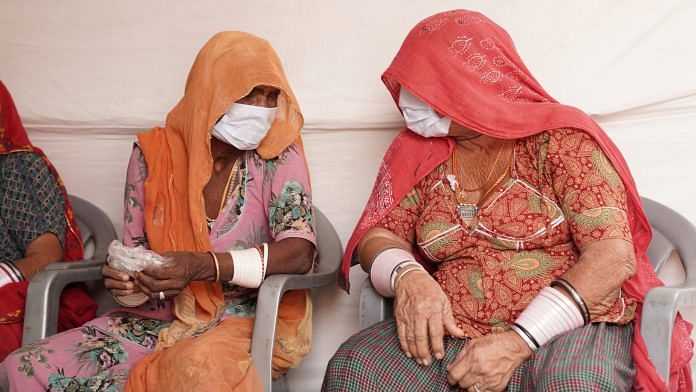New Delhi: The family is the prime perpetrator of abuse against senior citizens in India even though 82% of them live with their kin, according to a report by HelpAge India, a charity platform that works for the cause of the disadvantaged elderly population.
The survey stated that 35% of elders suffered abuse at the hands of their sons and 21% reported abuse by their daughters-in-law. About 2% of elders were abused by their house help, who is not a family member. The abuse reported ranged from ‘disrespect’ and ‘verbal abuse’ to ‘neglect’ and ‘physical violence’.
The nationwide household survey titled, “Bridge the Gap: Understanding Elder Needs”, was officially unveiled at Delhi’s India International Centre Tuesday, a day before ‘World Elder Abuse Awareness Day’ on 15 June. The report covered 22 cities and collected responses from 200 elders and 100 caregivers from each city.
“It’s a fairly large sample. We always talk about the poor section of the country but this time we have focused on the middle class because we might believe they might be relatively well off but they are also facing challenges and we thought it was a good time to air those challenges,” said NGO’s policy head Anupama Datta, while presenting the research findings.
Datta also said even though family was still one of the biggest support structures for the elderly people in India, she couldn’t deny that there were no gaps or dysfunction there.
The report showed that the number of elderly abuse victims ranged from 2.5% (in Chandigarh) to 23% (Dehradun) and that 46% of those surveyed were not aware of any abuse redressal mechanism.
“This indicates that there is an urgent need to fill the gap by introducing awareness campaigns with better reach,” the report said.
R. Subrahmanyam, Secretary, Ministry of Social Justice and Empowerment, who presided over as the keynote speaker at the event talked about how government initiatives like Maintenance and Welfare of Parents and Senior Citizens Act, 2007 were not being utilised properly by the victims not because they had reduced in number but because they were not many were approaching the tribunal.
“India is a queer country, we have wonderful practices and some shameful practices like complete neglect towards elders. Government of India pledges its support to the work done by HelpAge India. With organisations like them, we have finalised a policy for senior citizens, which will come out in the next few months, said R. Subrahmanyam.
He also talked about the government’s plan to assist HelpAge in its effort to organise 40,000 elders into “aggressive groups”, which would be launched this year. These groups will comprise senior citizens who wish to work after their retirement and contribute to the society by offering teaching assistance to children with needs, helping people in hospital and maintaining public assets among other engagements.
The proposed welfare scheme was in congruence with one of the suggestions highlighted by the report meant to bridge the gap between the pension/savings of elderly and their cost of living. Financial insecurity was a pertinent issue faced by 57% of elderly surveyed in the report whose expenses exceeded their savings or income. About 45% had reported inadequacy of pensions while 38% had cited lack of employment opportunities as their reasons.
Also read: India’s senior citizens are an untapped group. For startups, they can mean new business
Panelists’ perspective
Human Rights Commission Dr Dnyaneshwar Manohar Mulay, United Nations Population Fund (UNFPA) Deputy Representative Sriram Haridass, Head of Department of Social Welfare at Delhi University professor Pamela Singh also weighed in on the issue of unfair treatment of senior citizens.
“Right now, India has 138 members, which are 60 years and above and in the next 15 years, India will add 90 million more in the age group…Covid has only made things worse, it not only threatened the economy but the lives and well-being of the elderly. Digital literacy led to the exclusion of many elderly from the vaccination drive in the country…Covid has also shown how social support measures to reduce isolation and increase solidarity must also be put in place,” said Sriram Haridass.
He also highlighted the income disparity between men and women, noting that it was an important aspect because the old population in India is predominantly female. Since women outlived men, it severely affected the financial status of women at a vulnerable age, he said.
Elaborating on this point, professor Pamela Singh also said that since they were reviewing the national policy on the elderly in India, the fact that old women were more vulnerable due to the gendered nature of society should be considered, and pushed for compilation of “sex-disaggregated data.”
She remarked that the findings of the HelpAge report “is based on research, on grassroot reality, so it is truthful and important to read and understand”.
Also read: States miss deadline to set up helpline for elderly during Covid. Govt says but Covid’s to blame






